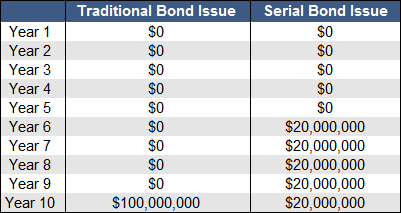What are Serial Bonds?
Serial bonds (or installment bonds) describes a bond issue that matures in portions over several different dates. Instead of facing a large lump-sum principal re-payment at maturity, an issuer can opt to spread the principal repayment over several periods.
How Do Serial Bonds Work?
Normally, when a company or government body issues bonds, all of those bonds mature on the same date (that is, the borrower must repay all of the debt on one particular day). A serial bond issue, however, matures over several periods (usually at regular intervals).
For example, the issuer of $100 million in traditional bonds with ten-year maturities will have to make a $100 million principal payment at the end of the tenth year (see the table below). But the issuer of $100 million in serial bonds might structure the offering such that $20 million matures after five years, another $20 million matures the year after, $20 million the year after that, and so on.

Why Do Serial Bonds Matter?
note in the example above that the reduction in outstanding principal over time means that the issuer of serial bonds pays less interest over the life of the issue than the issuer of traditional bonds does. The traditional-bond issuer must make coupon payments on $100 million of outstanding debt for a full ten years, whereas the serial-bond issuer must only do so until year five. After year five, the issuer redeems $20 million of that debt and thus only has to pay interest on $80 million, then $60 million, then $40 million, and so forth. This can represent a considerable cash savings, assuming the issuer is able to make the promised principal repayments.
Serial bonds also allow the issuer to time the maturity dates to the income from the project financed by the bond proceeds. This is why so many municipal bond issuers prefer serial bonds. Consider a toll road a city might construct and open in phases. As the road is completed, the city generates more and more revenues over time from drivers. Thus the city might issue serial bonds that mature after the completion of each income-generating phase, which provides the funds for repayment and therefore somewhat lowers the chance of default. Thus, the issuer is able to match revenue with its payment schedule.



